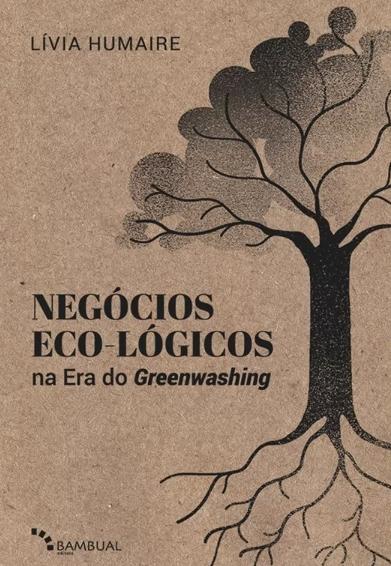New book by activist Lívia Humaire proposes to be a guide for those who want to create a project from scratch or redirect an existing company
After teaching the online course Training in Ecological Business, in which she mentored more than 80 entrepreneurs, most of them Brazilians, focused on developing truly sustainable businesses, and starting an ecological company herself – the first zero waste store in Brazil (which is not more in operation), São Paulo geographer Lívia Humaire is now launching the book “Eco-logical Business in the Era of Greenwashing”, by Bambual Editora.
Previous experience as a mentor, consultant and entrepreneur helped in the development of the book, which, according to her, serves as a guide for those who want to create an ecological project from scratch or even redirect an existing one.
Living in Basel, Switzerland, for three years, Lívia explains, in this interview to EXAME, what defines an ecological business, talks about the pricing challenge of this type of company and analyzes how the development of this type of enterprise is going in Brazil and in outside.
Her new book talks about the fundamentals of green business. What are these fundamentals for a business to be truly green?
What I have studied and observed is that businesses that I call green necessarily include five fundamentals:
- reduce negative environmental impact;
- increase positive social impact;
- cause changes in habits;
- form an engaged community;
- participate in a socio-technical change – which are medium and long-term changes that alter some type of system in force in society.
A great example of this last foundation is what is happening now with organic waste composting companies in Brazil. More than 80 of them are leading, together with greater awareness of the population and other stakeholders, a change in the disposal system of this type of waste. Laws are being passed in several municipalities, initiating a structural change in the destination of organic waste for industrial composting systems.

Do you notice that some entrepreneurs end up doing “greenwashing” out of ignorance? Do you think your business is green, but it’s not?
Yes, unfortunately it happens. Basically there are three types of companies when it comes to the practice of greenwashing:
- those who practice greenwashing without really knowing that they are incurring this practice;
- companies that know exactly that they are greenwashing and continue to “surf the wave” of sustainability;
- companies that are already born to solve socio-environmental issues, where such practices are practically null.
I can cite examples of greenwashing that are occurring quite commonly in our daily lives and that readers should be familiar with.
The so-called “carbon neutral” has become not only a national but a global fever. It’s everywhere! However, this sustainability “label”, which attracts a lot of attention from the end consumer, is nothing more than a “green marketing” strategy that in practice does not solve anything for our problem in relation to climate change and the ecological crisis. But we can easily see everyone believing that buying “carbon neutral” products is “doing our part” in the face of the gigantic socio-environmental problem we are experiencing.
A good example to clarify this is automotive lubricating oils that have the phrase “carbon neutral” stamped on their packaging. There is no chance that such a product, coming from oil, can “become” carbon neutral, this is because the carbon coming from this automotive lubricant would never be released into the atmosphere if it were not for human action, and in this case, offset such carbon by planting trees is not compensation but deception. Those are Carbon Market Watch’s own words, to name just one of thousands of serious sources on the subject. We need to fight this practice, mainly so that people are mobilized for really effective actions, and not made up.
What are the main mistakes, if we can call it that, of those who undertake an ecological business? Or, if not errors, difficulties.
One of the biggest difficulties of green business is pricing. I had a lot of difficulty [I founded the first zero waste store in Brazil, which no longer exists] and I see many entrepreneurs going through the same thing.
It is important to understand that businesses that internalize (consider throughout their business model) social and environmental issues in a structural way, unlike conventional businesses, will have products and services with higher prices compared to products of the same line, in a conventional business.
This is a sore point for business sustainability that few people debate. The common debate is that sustainability needs to be accessible. And I go further, after having experienced firsthand what it is like to keep a business standing that counts environmental damage and positive social impact: sustainability cannot be more accessible, this is what is really not sustainable, as it is impossible to compete with products made in a socio-environmental carefree way.
To solve this equation, we need to think about increasing income and wages so that people can access better and more durable products and services. When I say that sustainability needs to involve the social dimension, this is one of the issues that we need to debate and work on.
An example that I see happening in Brazil is the natural cosmetology movement. The small solid cosmetics company, which uses raw materials from a women’s cooperative in the Amazon, who chooses the carton and paper packaging to sell them, which pays fair wages, will not have the same price as the solid shampoo from a big industry.
Another very important point: large companies have never moved to deliver solid products (even though the technology already exists for this) to the final consumer. This work was hard pushed by small and committed artisanal natural cosmetology companies in Brazil. After a significant portion of end consumers were adept at such products, these companies began to offer similar products on the market at prices much lower than those of artisanal companies, strongly harming small companies that provoked and designed new production chains of clean cosmetology for the planet and people. Without them, the big ones would never move in that direction.
This movement is observed not only in Brazil, but in European countries.
How do you see the advancement of ecological business in Brazil? Is there a breakthrough? How are we in relation to other countries?
I see that Brazil has enormous potential for green business, both from the point of view of positive social impact and of reducing negative environmental impact. On the other hand, very little incentive in the political structure exists for businesses that are true agents of change like these, and this ends up being a dangerous obstacle, because with businesses that are “unprotected” legislatively speaking, few manage to generate financial maturity and survive. Despite this scenario, even with the pandemic, it is possible to see advances and growing interest in better business for people and the planet in the country. I have closely followed this movement throughout Brazil. Entrepreneurs need support to continue the journey, as well as tax incentives.
In other countries, if we are talking about the so-called “developed” countries, there is a structure of public policies that support these initiatives and, therefore, reach a certain robustness, more quickly when compared to Brazil. However, from the point of view of scaling up positive social impact, most outside are in their infancy. They do very well on foundation 1 – reducing negative environmental impact – but on foundation 2 there are few businesses that really care about that.



